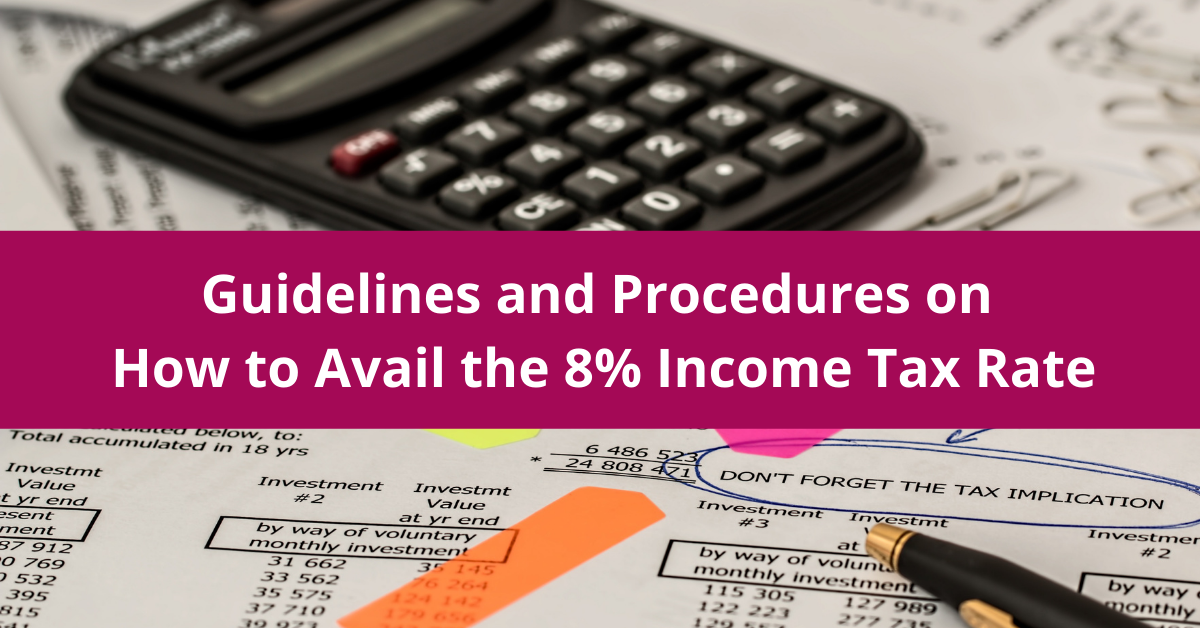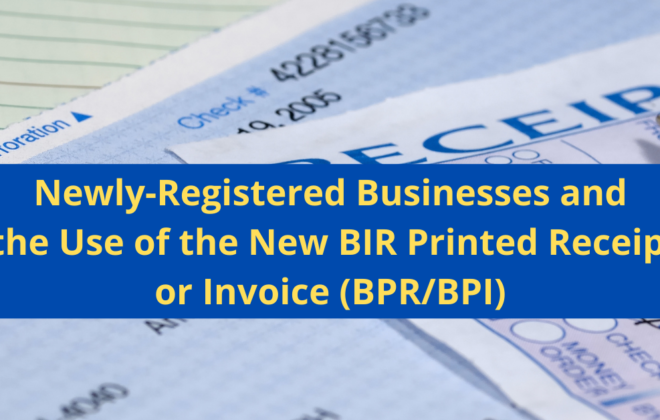Guidelines and Procedures on How to Avail the 8% Income Tax Rate
Still can’t decide which is the most cost-effective tax rate?
Don’t worry as we are going to discuss if the 8% income tax rate is the best option for you.
As a registered taxpayer, you must file your Percentage Tax (BIR Form 2551) or Quarterly Income Tax return (BIR Form 1701Q). Filing these returns will require you to choose whether you will be taxed under the Graduated Tax Table or use the 8% Tax Rate.
But before you decide on what tax rate to use, it is essential to know the choices available. For now, let us discuss the 8% Income Tax Rate. What is the 8% Tax Rate, who may avail, and how to compute your tax due?
What is the 8% Tax Rate?
The 8% tax rate is a simplified rate for income tax, which is based on your gross revenue in excess of P250,000. If you choose this option, you will no longer need the Graduated Tax Table under this scheme.
As we all know, if you are a new business and are still learning the ropes of tax computation and filing, the Graduated Tax table looks complicated since there are income brackets and percentages that you should consider before you compute the tax due.
However, under the TRAIN Law, tax computation is now made simple for individuals to comply and pay their income tax. To compute the tax due, you only need to multiply the 8% tax rate by the total gross sales or receipts minus PHP 250,000.00.
Moreover, choosing the 8% tax rate would exempt you from paying the 3% Percentage Tax (now 1% until 2023).
Who is allowed to use the 8% tax option?
This new tax rate is available for individual taxpayers only who are:
- Self-employed (Single proprietorship, professional or mixed-income earners);
- Non-VAT registered filers;
- Gross sales or gross receipts do not exceed three million pesos.
How do I avail of the 8% Tax Rate?
There are two ways to signify your intention to elect the 8% tax rate.
- Upon business registration or renewal of business registration, using BIR Form 1905;
- Upon filing BIR Form 2551Q or 1701Q for the initial quarter of the taxable year.
Note: Do not forget to signify your intention to use the 8% Tax Rate. Otherwise, you will be automatically taxed using the Graduated Tax Table.
Also, some RDOs may require you to update your COR if you want to avail of the 8% tax.
What are the implications of availing of the 8% Tax Rate?
The eight-percent (8%) tax rate filers should take note of the following:
- You are no longer required to file and pay Percentage Tax (BIR Form 2551Q);
- You are not required to attach your financial statements when filing your annual income tax return;
- You are no longer allowed to deduct expenses incurred by the business.
How to Compute the Tax due using the 8% Tax Rate:
- Purely business or professional income – refers to income source from business or practice of a profession.
Problem:
Mr. X owns a grocery store with gross sales of P300,000.00 for the first quarter of the taxable year. He is also a CPA, doing bookkeeping and tax filing services. He earned P100,000.00 for the quarter.
How much would be Mr. X’s tax due using the 8% Tax Rate?
Answer:
Gross Sales from business P300,000.00
Add: Income from practice of profession 100,000.00
Less: Income not subject to taxes (250,000.00)
Net Taxable Income P150.000.00
Multiply by tax rate 8%
Tax Due P 12,000.00
Note:
The 250,000.00 income not subject to income tax is an annual fixed amount and is not to be claimed per quarter.
- Mixed-Income – refers to income from employment and business or professional income.
Problem:
Mr. X owns a grocery store with gross sales of P300,000.00 for the first quarter of the taxable year. He is also a CPA, doing bookkeeping and tax filing services. He earned P100,000.00 for the quarter.
Additionally, Mr. X is a Finance executive of Y Corporation. He earns P100,000.00 monthly salary. How much would be Mr. X’s tax due using the 8% Tax Rate?
Answer:
Gross Sales from business P300,000.00
Add: Income from practice of profession 100,000.00
Total Taxable Income P400.000.00
Multiply by tax rate 8%
Tax Due P 32,000.00
Note:
Compensation income is taxed separately, using the Graduated Tax Table. The 250,000.00 income not subject to tax is claimed when computing for Compensation Income tax due.
We hope that this post will help you choose the best tax rate option.
Should you need further assistance regarding your tax compliance, DJKA Business Services would be happy to help you prepare and file your taxes for you. Just email us at info@djkaaccounting.com.
Recent Posts
- New Features and Functionalities of the Online Registration and Update System (ORUS)
- A Comprehensive Guide to Taxation for Freelancers in the Philippines
- New Tax Laws in 2024: What Changes Filipino Taxpayers Should Prepare For
- How to Avoid Common Tax Mistakes in 2024
- Tax Deductions and Benefits Often Overlooked by Filipino Taxpayers





